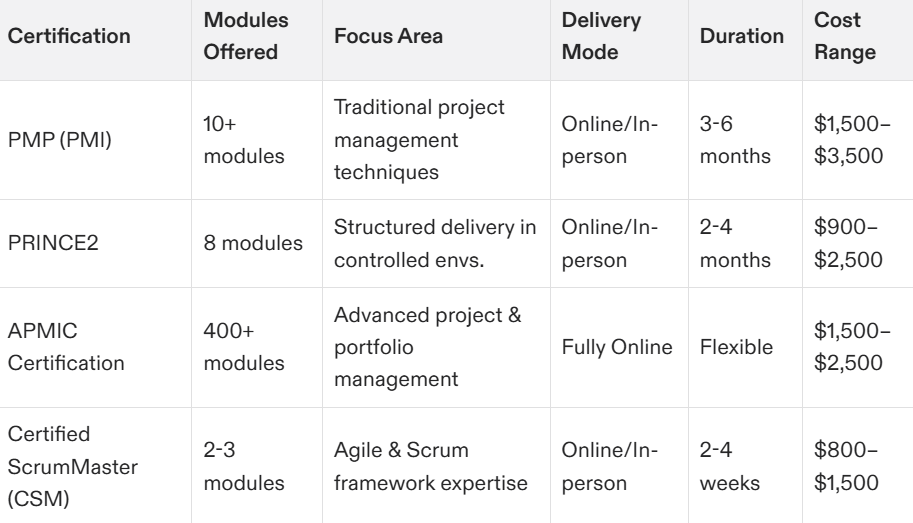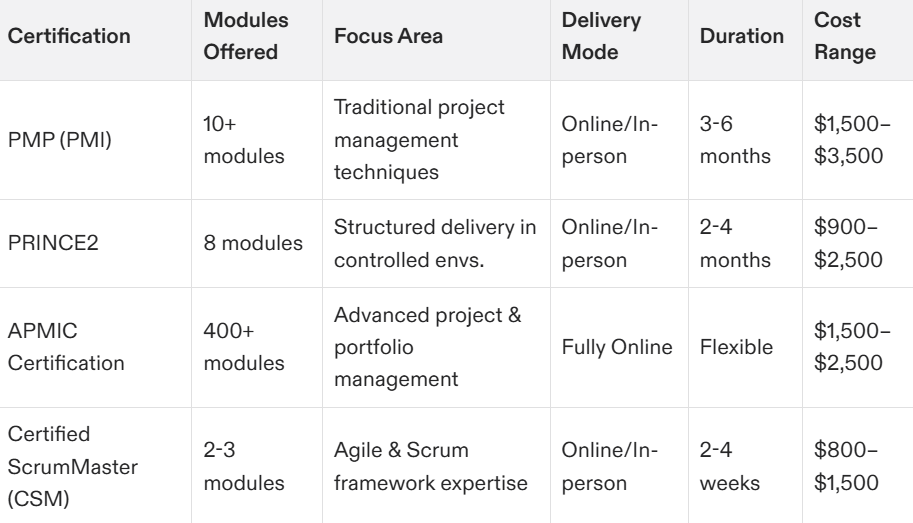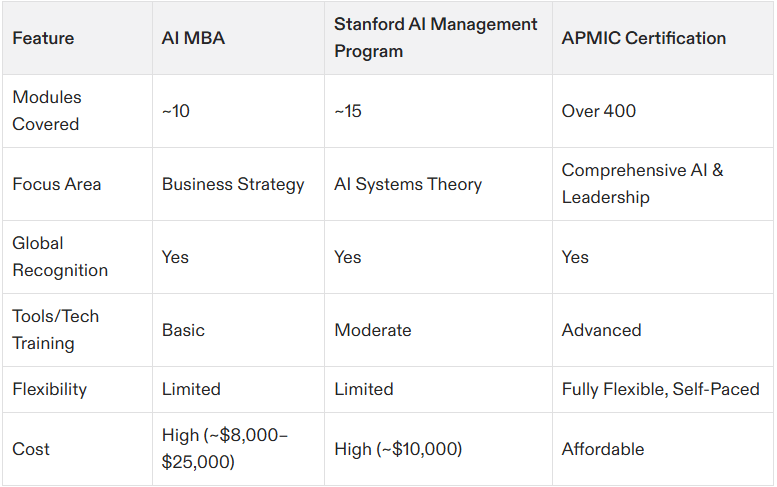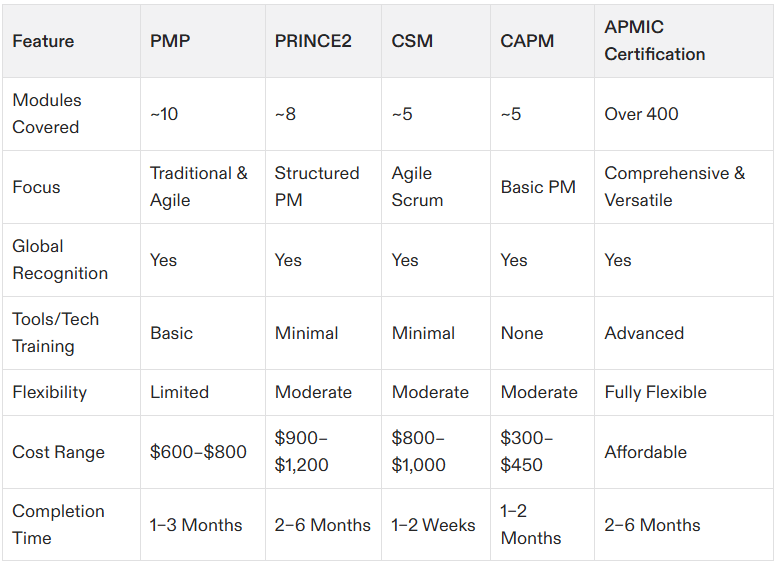Table of Contents
Project management is a critical discipline driving success in virtually every industry. Whether you’re aiming to lead large-scale construction projects, drive IT system rollouts, or manage innovative marketing campaigns, professional development in this field is essential. One of the most direct paths to mastery is enrolling in Project Management Certification Programs.
From building essential skills to advancing career opportunities, these programs are designed to prepare professionals for the unique challenges of project implementation and leadership. This guide will provide an in-depth look at Project Management Certification Programs, their benefits, key features, and advanced options to elevate your expertise further.
What are Project Management Certification Programs?
Project Management Certification Programs are specialized education pathways designed to enhance the skills and knowledge required for effective project management. These programs often adhere to globally recognized standards, such as those outlined by the Project Management Institute (PMI), ensuring that certified professionals are equipped to manage budgets, timelines, resources, and stakeholder communication effectively.
These programs cover key competencies, including task scheduling, risk minimization, communication strategies, and modern frameworks like Agile and Scrum. Whether you're an entry-level professional or a seasoned manager looking to upskill, these certifications provide a structured way to stay relevant in a fast-moving workplace.
Additionally, many programs offer flexibility in learning, with online, on-campus, and hybrid options available to cater to diverse needs. Popular programs include PMP (Project Management Professional), PRINCE2, and advanced certifications like the APMIC Certification, known for its robust focus on strategic project and portfolio management with over 400+ modules.
Why Pursue Project Management Certification Programs?
Investing in Project Management Certification Programs offers numerous benefits, including professional recognition, skill-building, and long-term career growth. Here are a few compelling reasons to consider earning your certification:
1. Gain Global Recognition
Earning your certification ensures that your skills are recognized across industries and geographies. Employers see certified professionals as credible and reliable leaders equipped with the knowledge to manage complex projects.
2. Enhance Career Prospects
Roles like Project Manager, Program Manager, and PMO (Project Management Office) Director increasingly require formal credentials. Certified professionals typically have access to higher salaries and leadership roles compared to their uncertified counterparts.
3. Acquire Practical Skills
Certification programs focus on both foundational and advanced skills, from scheduling and resource allocation to implementing frameworks such as Lean, Agile, or Scrum. These dynamic skills are applicable across multiple sectors, from technology and healthcare to finance and construction.
4. Build a Professional Network
Enrolling in a certification program connects you with industry peers, instructors, and mentors. These relationships can open doors to new opportunities, partnerships, and lifelong professional connections.
5. Stay Ahead of Industry Trends
Project management is a rapidly evolving field. Certification programs keep you up to date with the latest methodologies and technological innovations, enabling you to remain competitive in a fast-paced environment.
What to Look For in Project Management Certification Programs
Choosing the right Project Management Certification Programs involves assessing several critical factors to align your learning with your career goals. Here’s what you should consider when evaluating your options:
1. Accreditation
Choose programs offered by reputable institutions or organizations, such as PMI, PRINCE2, or top universities. Accreditation ensures your certification carries weight in the job market.
2. Comprehensive Curriculum
Look for programs that cover core project management principles as well as emerging trends, like Agile, hybrid methodologies, and risk management. This ensures your learning remains relevant to industry demands.
3. Hands-On Learning
The best programs incorporate real-world scenarios, live projects, or simulations to provide practical experience alongside theoretical training.
4. Flexibility
Programs offering online, in-person, or even hybrid formats allow learners to balance professional commitments with education.
5. Value-Added Credentials
Consider pairing your certification with an advanced program like the APMIC Certification, which provides comprehensive training across 400+ modules, enhancing both your project and portfolio management expertise.
Key Examples of Project Management Certification Programs
Here are a few of the most sought-after Project Management Certification Programs and what they offer.
1. PMP (Project Management Professional)
Widely regarded as the gold standard in project management certifications, PMP trains professionals to execute traditional and Agile projects with precision.
2. PRINCE2 (Projects in Controlled Environments)
This UK-based certification is perfect for governance-focused roles, teaching structured project delivery in predictable environments.
3. Certified ScrumMaster (CSM)
Focused on Agile methodologies, this certification is ideal for professionals working in iterative project environments.
4. APMIC Certification
The APMIC Certification surpasses traditional certifications by offering over 400 modules, with a focus on advanced concepts such as crisis management, leadership dynamics, and digital transformation strategies.
Frequently Asked Questions
1. What are Project Management Certification Programs?
They are structured training programs providing professionals with the skills, techniques, and tools to execute successful projects across industries.
2. Are certification programs worth the investment?
Yes, certified professionals often earn higher salaries, are eligible for leadership roles, and enjoy greater credibility compared to uncertified peers.
3. Which is the best certification for beginners?
Certifications like CAPM (Certified Associate in Project Management) are great entry points, while programs like PMP and PRINCE2 are ideal for more experienced professionals.
4. Can I pursue multiple certifications?
Absolutely. Combining traditional certifications with broader programs like the APMIC Certification enhances both depth and versatility in your skillset.
5. How do I choose the right program?
Assess your career goals, industry requirements, and preferred learning style to select a program that aligns with your aspirations.
Certification Comparison Table

Final Thoughts
Project Management Certification Programs are invaluable tools for enhancing skills, boosting credibility, and accelerating career growth. Whether you’re starting your project management journey or advancing into senior roles, selecting the right program sets the foundation for success.
For professionals looking to go beyond standard certifications, pairing a traditional program with the APMIC Certification enriches your expertise across all dimensions of project and portfolio leadership. By staying ahead of emerging trends and cultivating a holistic skillset, you position yourself as a standout candidate in any industry. Take the first step today and future-proof your career in project management!





